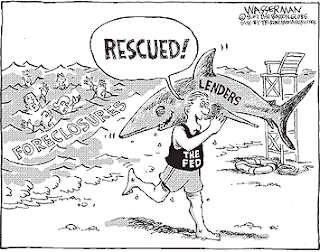 In another desperate move to inject liquidity into the marketplace, the heads of the Fed and the Treasury began discussions with Congress late yesterday on legislation that would allow the Government to purchase hundreds of billions of dollars of depressed mortgage-backed securities. At the heart of this plan (dubbed the “troubled asset relief program” or TARP from a phrase used in a statement today by Treasure Secretary Henry Paulson) is the creation of a federally-backed investment vehicle into which banks could sell, at a massive discount, these toxic securities to the Government to remove them from their books. Though it is unclear how such securities would be valued, what is clear is that this would be the largest bailout by the U.S. Government since the Great Depression, and potentially the largest in its history.
In another desperate move to inject liquidity into the marketplace, the heads of the Fed and the Treasury began discussions with Congress late yesterday on legislation that would allow the Government to purchase hundreds of billions of dollars of depressed mortgage-backed securities. At the heart of this plan (dubbed the “troubled asset relief program” or TARP from a phrase used in a statement today by Treasure Secretary Henry Paulson) is the creation of a federally-backed investment vehicle into which banks could sell, at a massive discount, these toxic securities to the Government to remove them from their books. Though it is unclear how such securities would be valued, what is clear is that this would be the largest bailout by the U.S. Government since the Great Depression, and potentially the largest in its history.
Though, at the behest of the Fed and Treasury, Congress plans to work overtime over the next few days in the hopes of passing legislation to authorize this proposal, the Fed has not felt the need to obtain legal sanction for its slew of recent bailouts. These include subsidizing the sale of Bear Sterns to JPMorgan in March, bailing out Freddie and Fannie last week, and issuing a loan of $85 million to effectuate the takeover insurance conglomerate AIG this week and save the behemoth from insolvency. Questions abound over the legality of this last move, some of which are addressed here, though few jurists seem to believe that a court would even entertain a challenge to the Fed’s action.
Though litigation to challenge or block the Fed’s recent actions might not bear fruit, there is little doubt that the continued expansion of this crisis will bring a new wave of lawsuits to courts around the country. Just this week, for example, Merrill Lynch shareholders filed suit in New York State Supreme Court over BofA’s proposed buyout of the brokerage firm for $50 billion. The suit, filed by law firm Murray, Frank & Sailer, alleges that Merrill’s board has withheld from the public stockholders certain information regarding the financial condition of the brokerage and its prospects. In essence, the suit maintains that Merrill CEO John Thain and its board acted in their own best interests at the expense of their shareholders, who were denied fair process and terms in the sale.
Such suits have become and will continue to be commonplace as shareholders bear the brunt of the efforts of struggling financial institutions to avoid drowning in the abyss of the credit crisis. But will anyone step up and challenge the unprecedented actions of the Federal Reserve or the Treasury in seeking to stop the financial dominoes from falling? While it’s far from clear whether the Fed’s authority to give emergency loans allows it to step in and take over struggling financial institutions, only time will tell whether such a challenge would even make it through the jurisdictional gates of the courthouse.


